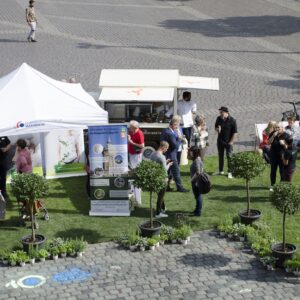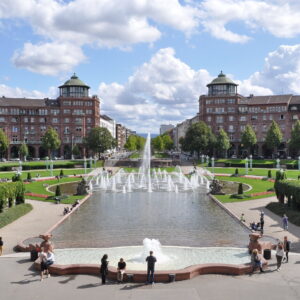Novel governance arrangements to enhance social innovation in energy transition in Mannheim
Working with residents to foster social innovation that leads the city towards a more sustainable energy future
City Lab research led by: the City of Mannheim and Fraunhofer ISI
Our context
With its 326,000 inhabitants who hold 170 nationalities, Mannheim is the economic and cultural centre of the Rhein-Neckar metropolitan region – a dynamic region with located at the edge of three German states (Baden-Württemberg, Rheinland-Pfalz, Hessen).
Mannheim is a member of many international networks engaged in climate action and energy transition. In 2018, Mannheim was one of the first cities worldwide to implement the Sustainable Development Goals (SDGs) on a local level through a broad participation process. The result of this process is the so-called “Mission Statement Mannheim 2030,” which aims to develop climate resilience and achieve climate neutrality by 2050.
City Lab description
The City Lab in Mannheim focused on novel governance arrangements to enhance social innovation in energy in the district of Neckarstadt-West. The aim was to foster collaboration between diverse stakeholders, strengthen dialogue within the city administration, and encourage citizen participation.
To mitigate the impact of the pandemic, the City Lab implemented two concrete experiments that could be carried out under restrictions. First, the City Lab used a Mobile Green Room® to show the benefits of urban green structures in the densely built district. Second, awareness among local residents on energy consumption challenges was raised through the city’S KliMAthon App. Collaboration with Neckarstadt-West will continue: in May 2021, the City of Mannheim received financing for urban energy renovation management to be implemented in the district over the next three years, with a possible extension for two more years.
Key learnings
- Close cooperation with local stakeholders and multipliers from the beginning of the City Lab helped establish a “coalition of the willing” and contributed to a better understanding of local needs.
- It is difficult to start a conversation on energy transition in districts facing social challenges, in which climate change is not on the top of the agenda. It was helpful to focus on energy-related issues relevant for the neighbourhood, and to engage existing social networks when developing activities.
- Digital tools and innovative methods help engage citizens on a larger scale. However, they should be tailored to the local context and to specific challenges and needs.
- It is important to seek ways to include the City Lab experiments in long-term action plans or strategies.
Read the Mannheim City Lab report here.
Contact and more information
Additional links:







 The project has received funding from the European Union’s Horizon 2020 research and innovation programme under grant agreement No 837498.
The project has received funding from the European Union’s Horizon 2020 research and innovation programme under grant agreement No 837498.